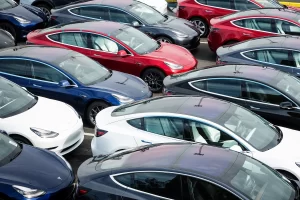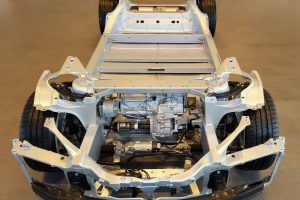- 💼 The Indian government announces an updated policy for electric vehicles, aiming to make the country more friendly to EV imports.
- 🏭 Companies interested in importing EVs into India are required to make a minimum investment of ₹4,150 crore and set up local manufacturing facilities.
- 📈 The policy mandates companies to achieve a minimum Domestic Value Addition (DVA) of 25% within three years and 50% within five years to qualify for reduced import duties.
- 🚗 Companies meeting the criteria can import up to 8,000 electric vehicles per year at a reduced import duty of 15% if they invest $800 million or more into India.
- 🔒 To ensure compliance, companies must provide a bank guarantee in lieu of the custom duty forgone, which will be invoked if targets aren’t met.
- 🌍 Tesla might be attracted to India’s updated EV policy, but uncertainties remain regarding import caps and production facility development.
As the world shifts towards sustainable transportation solutions, the Indian government has taken a significant step towards fostering a more welcoming environment for electric vehicle (EV) imports. With the recent announcement of an updated policy tailored to incentivize EV manufacturers, India is poised to become a key player in the global EV market.
Understanding the Policy Shift
The revised policy aims to streamline the process for companies seeking to import electric vehicles into India. By setting clear guidelines and incentives, the government hopes to attract investment and stimulate local manufacturing in the EV sector. Let’s delve into the key aspects of this policy shift:
- Minimum Investment Requirement: To initiate operations in India, companies must commit to a substantial investment of ₹4,150 crore, emphasizing the government’s dedication to attracting serious players in the EV industry.
- Local Manufacturing Mandate: Setting up local manufacturing facilities is a prerequisite for companies interested in importing EVs into India. This requirement not only promotes job creation but also contributes to the development of indigenous EV technology.
- Domestic Value Addition (DVA): The policy outlines progressive targets for DVA, ensuring that a significant portion of EV components is sourced locally. This not only fosters self-reliance but also strengthens India’s position in the global supply chain.
- Import Quotas and Duty Reductions: Companies meeting the investment and DVA criteria are eligible to import up to 8,000 electric vehicles annually at a reduced import duty of 15%. This incentivizes companies to invest in India while simultaneously bolstering the country’s EV infrastructure.
- Compliance Measures: To uphold the integrity of the policy, companies must provide a bank guarantee to cover custom duty forgone. This measure ensures accountability and discourages non-compliance.
Implications for Industry Players
The revamped EV policy presents a lucrative opportunity for both domestic and international EV manufacturers. With India’s burgeoning market potential and supportive regulatory framework, companies have a chance to establish a strong foothold in one of the world’s largest economies.
- Domestic Manufacturers: Local players stand to benefit from increased demand and government incentives, encouraging innovation and competitiveness within the industry.
- International Players: High-profile EV manufacturers like Tesla may find India’s updated policy enticing, despite lingering uncertainties. While import quotas pose limitations, the promise of reduced duties and a growing consumer base could outweigh potential challenges.
Looking Ahead: Opportunities and Challenges
As India embarks on its journey towards a greener automotive landscape, several opportunities and challenges lie ahead:
Opportunities:
- Market Expansion: With a population of over 1.3 billion people, India offers a vast market for EV adoption, presenting ample opportunities for growth and expansion.
- Technological Innovation: The push towards local manufacturing incentivizes R&D investment, fostering innovation and technological advancements in the EV sector.
Challenges:
- Infrastructure Development: Addressing infrastructure gaps, including charging stations and grid capacity, remains a critical challenge for widespread EV adoption in India.
- Policy Implementation: Ensuring effective implementation and enforcement of the EV policy is paramount to its success, requiring collaboration between government agencies, industry stakeholders, and regulatory bodies.
Conclusion
India’s updated EV policy marks a significant milestone in the country’s journey towards sustainable mobility. By prioritizing investment, local manufacturing, and innovation, India aims to emerge as a formidable player in the global EV market. While challenges persist, the opportunities presented by India’s evolving automotive landscape are too significant to ignore.





